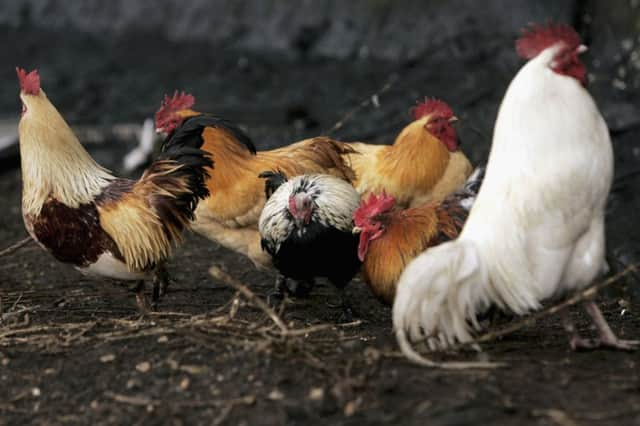Research could end poultry parasite scourge


Addressing a major congress in Edinburgh, Professor Fitzpatrick indicated that a vaccine produced at the institute could reduce red mite populations in laying hens by between 35 and 40 per cent.
She described the progress being made at the Moredun as a “brilliant example of how a small Scottish organisation could potentially deliver a global product”.
Advertisement
Hide AdAdvertisement
Hide AdRed mite infestations are a major health and welfare problem throughout the poultry world – a recent review of the scale of the problem in the European Union estimated a loss of production of approximately €130 million (£102m) annually.
The problem may not be monitored as closely in less developed countries but egg production often provides much-needed protein for many less well-off families around the globe and any reduction in egg laying can lead to poorer diets.
The parasitic mite, which lives in the dark corners of henhouses and cages emerges in darkness to suck blood from the hen, initially causes loss of feathers as the host bird scratches at the irritation. But heavier infestations bring on anaemia, a loss of egg laying productivity and in extreme cases death.
For egg producers, current control measures rely on two main insecticides being painstakingly and expensively used to spray the pens and cages in order to kill the mites. Other insecticides have been withdrawn as their efficacy has decreased with the mites building up immunity.
Commercial egg producers also face the problem of blood gorged mites being squashed against newly laid eggs leaving an unsightly blood-stained shell – eggs with blood spots are rejected by producers.
The novel approach taken at the Moredun is to develop a vaccine from extracts from the mites to provide the laying hen with an inbuilt resistance.
“I am glad to say we are making significant progress with this method of control. We are producing results with a 35 to 40 per cent kill of the mites with our novel vaccine,” said Fitzpatrick.
She added that Moredun had become involved in the million pound plus research project after developing a similar type of vaccine aimed at controlling sheep scab.
Advertisement
Hide AdAdvertisement
Hide AdThe vaccine would be applied with two injections and it would fit in with existing vaccination programmes. This programme would give lifetime protection from mites for the hen.
However, she cautioned delegates from all the major commercial egg-producing countries that there was still some way to go. Removing one third of the parasites might indicate progress but there was the possibility that the remaining mites could flourish with the reduced competition.
“We need a better level of efficacy and that is what we are working on developing now,” she added.
Fitzpartick underlined the worldwide importance of the project with the funding partners ranging from the BEMB Trust through to Akita, the largest egg-producing company in Japan. Other major contributors include international pharmaceutical company Zeotis, the MB Trust, the Biotechnology and Biological Sciences Research Council and Defra. She paid specific thanks in putting the funding bid together to John Campbell, the driving force behind the Glenrath egg producing business in Peebles.